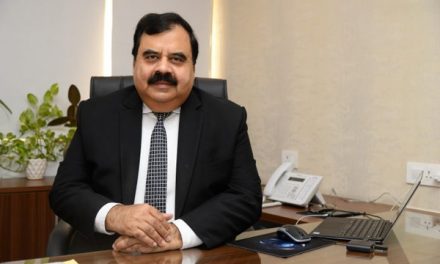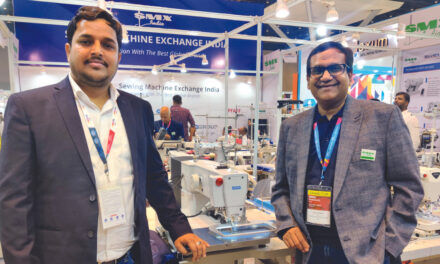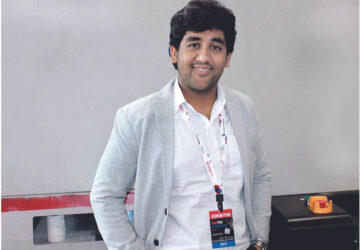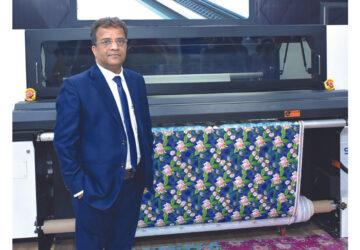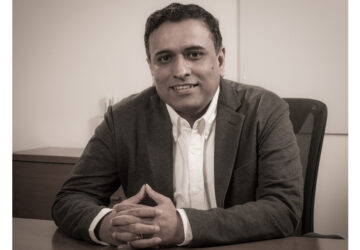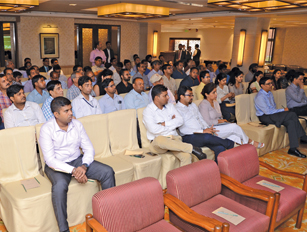
Hohenstein Institute is one of the world’s leading textile research & testing laboratories, offering a comprehensive range of independent, reliable and accurate testing, inspection and certification services to the textile & clothing industry. More than10,000 customers worldwide already benefit from the interdisciplinary know-how of 550 employees at the headquarters in Boennigheim, Germany and a worldwide network of over 48 contact offices.
Hohenstein India Pvt. Ltd. is the wholly owned subsidiary of Hohenstein Institute, headed by Amrut Desai, Managing Director, Hohenstein India with its headquarters in Mumbai, offers services exactly where you need it through its branches in Coimbatore, Ahmedabad, Delhi & Colombo (Sri Lanka). Hohenstein Institute aims to assist manufacturers, brand and retailers to showcase their commitments to sustainable textile production to their stakeholders in general and to their worldwide customers & consumers.
Continuing in line with its philosophy of unity of research, service & training, Hohenstein India, recently organized an interactive seminar on “Latest Developments in the Oeko- Tex® Product Portfolio” on 28th September 2017 at Juniper Hall, Habitat World India Habitat Centre, Lodhi Road, New Delhi.
The various presentations made during the seminar were about STeP by Oeko-Tex®: Tool to achieve process control; STeP by Oeko-Tex®: B2B Database to strengthen sustainable textile supply chain & Made In Green by Oeko-Tex®: Product label to communicate transparency and traceability in textile supply chain; and Detox to Zero by Oeko-Tex®: New comprehensive verification and reporting system to address – Greenpeace Detox Campaign. All the presentations were made by Jorg Diekmann, Director International Sales, Hohensetin Institute in the presence of Prof. Dr. Stefan Mecheels, President/CEO, Hohenstein Institute, Germany.
A total of 110 leading industry people from New Delhi, Gurugram, Noida and other nearby textile hubs like Panipat, Sonipat, Ludhiana, Jammu, attended the event. Besides, during the presentations attendees could raise their queries on the spot instead of waiting for the presentation to complete to ask any question. The initiative was very well applauded by the attendees and got very encouraging feedback. At the end vote of thanks was presented by Country Head Amrut Krishnarao Desai.
To know more about the company, Hohenstein Institute’s latest ventures and plans for the Indian market, Apparel Views Assistant Editor Swati Sharma spoke to Prof. Dr. Stefan Mecheels, Jorg Diekmann and Amrut Krishnarao Desai on the sidelines of the event. Given are some excerpts from their discussion….
Please tell us more about your company and what all services you are offering?
Jorg Diekmann: About 10,000 customers worldwide profit not only from the competence of over 550 employees at the Hohenstein Headquarters in Boennigheim, Germany, but also from a global network of international offices in more than 40 countries. Our expert teams on site can offer you our diversified range of products and services in all major textile production and shopping regions. For more than 70 years we have been specializing in the testing and certification of textile products of all kinds.
Hohenstein concentrates on everything that needs to be verified, certified, acknowledged, little-bit consultation of course, and finally everything required in textiles i.e. training, webinars, seminars, regardless of fibre, everything on textiles can be tested. Main areas of course are harmful substance testing, physical testing, etc. Our specialty is working in the area of fitting, which is most important story for success of a textile brands worldwide, so this way we can help the textile manufacturers worldwide. In the area of functionality, we test everything in sportswear under breathability & thermal regulations. So, our all-time offer is to do testing but in a way, that you can make your own specific marketing.
Why is testing and certification so important in textiles industry today?
Jorg Diekmann: First of all, the variety of textiles is so huge. So, how are you going to distinguish between textiles in qualities. If you want to use that then one of the most used thing in that is labeling. OEKO-TEX® association is very well-known globally especially in Europe, USA, and now is Asia also. You will find that it has excellent reputation and by that labeling becomes very efficient in terms of marketing, and that is differentiation.
Secondly, with testing of textiles you are proving not only the claim, you are underlying the quality. And you make sure that you are complying with the adjective claims you want to promote. So, therefore labeling and testing goes along. And its differentiation, recognition, marketing and at the end of the day is rising quality. If you want to distinguish more brands & products by quality, labeling is one of the selected options.
Please tell us about the latest OEKO-TEX ®certification that you have introduced?
Jorg Diekmann: The latest certifications are: STeP by OEKO-TEX®: Tool to achieve process control; My STeP by OEKO-TEX®: B2B Database to strengthen sustainable textile supply chain; MADE IN GREEN by OEKO-TEX®: Product label to communicate transparency and traceability in textile supply chain; DETOX to ZERO by OEKO-TEX®: New comprehensive verification and reporting system to address – Greenpeace Detox Campaign.
-
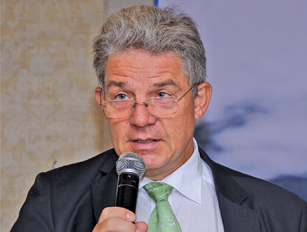
-
Jorg Diekmann, Director Internationl Sales, Hohenstein Institute
-
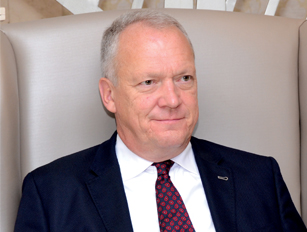
-
Prof. Dr. Stefan Mecheels, President / CEO, Hohenstein Institute
-
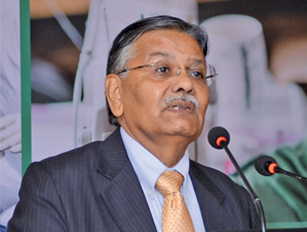
-
Amrut Krishnarao Desai, Country Head & MD, Hohenstein India
How do you support the sustainable and eco-friendly textiles in modern times and has this concept gained enough speed among the textile companies?
Jorg Diekmann: To start with last part, does it have speed in India, I would say no, because the recognition of the consumer is low. So, it cannot have speed in India now. It will grow because there are a lot of things in India which are growing, getting more recognition in terms of eco-friendly certification, as it’s the need of the hour. The topic of sustainability will definitively get more and more importance in the future. Today, big brands have started searching for sustainability verification via labeling. We see big impact in Europe but right now we see bigger impact in the US as in Europe label importance is stagnating. It’s pretty high, very important as it was in US and in last twelve months it has grown dramatically.
How certifications like OEKO-TEX® do makes a difference for sellers and customers both?
Jorg Diekmann: For customers, it gives an assurance and becomes easy for him to recognize if the brand reputation is OK and is it following all the norms. That’s a value as a customer, basically easy information about a very clear task. STANDARD 100 by OEKO-TEX ® for last 25 years is known for product safety so value is very simple on the plate. When it comes to value for the producers, it’s also very simple. They have one single certification which is globally comparable. Above that, a lot of buyers ask for STANDARD 100 by OEKO-TEX® certifications, so with one certificate you can fulfill the requirements of many brands. Your customer base as a producer can be very broad because STANDARD 100 by OEKO-TEX® is the most requested standard in this area.
Amrut Desai: India is a textile supplying country, trying to attain certain qualities as we have to supply to the buying world. The way we produce has an impact on our own environment here, so all these standards, STeP by OEKO-TEX® certifications, STANDARD 100 by OEKO-TEX® etc. when adopted and continuously practiced and attained as certifications by the manufacturers here in the region, finally result in protecting our own environment.
Some time back there was a high court order, in certain areas non-compliant factories needed to be shifted or shut down as they didn’t follow certain norms by PCB-Pollution Control Board, Govt of India. Today world recognized tools are available to the manufacturers! Through systematic and sincere implementation and attainment of certifications under STeP by OEKOTEX ®, STANDARD 100 by OEKO-TEX® Certifications, our manufacturing facilities become compliant with sustainable practices, then there will be reduced impact on environment. That’s how these certifications are very important.
What criteria, do you take into consideration at the time of issuing the certifications? What all a company needs in order to receive this authentication/ certification from your company?
Jorg Diekmann: For STANDARD 100 by OEKO-TEX®, the range of chemicals which are controlled is openly communicated and can be retrieved by every interested party from the internet. With STeP, we will certify textile and garment production plants and not focus on the products. The certification will cover environmental management system and performance, safety, quality, chemical management and finally social requirements.
Has OEKO-TEX® worked enough towards creating awareness among textile corporate houses with regards to sustainability and environmental-friendliness?
Jorg Diekmann: We are working on that every day. We are still not huge in terms of organisation, so our ability in terms of manpower is limited but with our marketing strategies in place working with all the brands, places, govt. regularities, we are wide spread out and think in a good way to make it more reputable and accepted by all participants in the market.
Amrut Desai: Sustainability concepts have been known to the Indian textile industry for a long time. The tools to showcase their commitments to this were not available earlier but through certifications like ours every year thousands of companies become compliant with these systems. So, I can very comfortably say that Indian manufacturing companies, not just the corporate houses even the smaller factories have become aware and have begun the process of becoming compliant so that, only they can achieve those exports targets. The awareness has come about but it’s a vast industry and more work needs to be done. We have spent over 10 years in India and are spreading this message.
Globally which is the most important market for you?
Jorg Diekmann: Asia is, of course very important to generate the certificates to fulfill our vision to making Europe safe product. So, we must see from both angles. Asia is most important from the production side, from the brand side Europe and US are equally important. When it comes to India market, we are at the beginning and India has a different textile structure than other countries. If you compare it with Bangladesh, that country is very much related to apparel and India is more to home textile, China to sports textile, polyester etc. Markets are completely different as we cover all aspects of textiles. For me all these markets are equally important.
How potential is Indian market for you?
Amrut Desai: Indian textile industry has great potential to become a significant player globally and is poised for further growth. Its global textile share is expected to increase dramatically in next 10-12 years. Compared to China, the kind on investment that have happened there in terms of machinery and upgradation of technology, we need to do a lot more here in India. We are the second most important supply source in the world after China and the Govt of India has undertaken measures to see that this industry is given required assistance. The technology up gradation fund has been created and they are trying to assist the industry to take it to the next higher level. But industry itself is having a strong base as it is a traditional industry and is poised for further growth here. Very ambitious plans are there and from current four per cent world trade by 2030 we wish to attain 8-10 per cent in world textile trade. Indian textile industry is a major contributor to in terms of earning foreign exchange for the country. So, it’s an important industry for us.
How’s the market in Bangladesh? Is the industry there going towards becoming more complaint now?
Jorg Diekmann: I would not put that in one or another corner. Compliance areas in each part of the world are little bit different. So, if Bangladesh maybe had some issue with compliance I would not rate that as difference. Whole industry, regardless where it is, in textiles they must improve in social, safety, environmental, chemical etc. whether India, Bangladesh, Turkey or China. There’s a lot room for improvement.
Where do you think, brands are lacking in terms of certifications?
Jorg Diekmann: The market needs clear transparency in terms of make and show what you do ‘Good’. Market itself needs to drive its own marketing in terms of spreading out success story. That is the most important way to achieve the different recognition you want with other textiles market. Price is not good but idea is speed, logistics, and excellence in production on one hand,and conformity with all the requirements in market on the other. Everybody is lacking here to come to a point where everything will be OK. Whereas a lot of companies in India are already extremely good, there is a small segment of medium ones which has a long way to go. The industry itself needs to elevate their reputation in general.
What’s your message to the end consumers?
Jorg Diekmann: The message to the end consumers is to buy products which at the end are sustainable. It’s a good message but also very difficult because you need to have a measure. So, how does a consumer gets its message, which is more sustainable than others? Therefore, we introduced ‘Made in Green’ which is a clear sustainable message. Finally, consumers are protected through our safety guidelines.
How has been the overall response to today’s seminar?
Prof. Dr. Stefan Mecheels: It was interesting event today as many people attended who were interested in sustainability topic. The no. of questions and discussions we had were unbelievably high. So, for me it’s a clear sign that the brands which are here as well as the producers had many questions regarding how can sustainability be reached? How OEKO-TEX® products work in? How can they proceed step-by-step? How they can come under certifications? Altogether, we had a wonderful event, and see many people in India are ready to take further step towards sustainability.
India is a very big country having so many textiles hubs, so as a company are you going to organise these events in other regions as well?
Prof. Dr. Stefan Mecheels: India is such a big country so you can’t do that from one place. Hohenstein has different offices in various locations in India like Mumbai, Delhi, Ahmedabad, Coimbatore. We have seen big interest here at Delhi event, so we will follow this strategy and do similar events throughout India.
Amrut Desai: Not only in India, but this office is responsible for Sri Lanka as well, so we have been conducting these seminars there as well. Only when you disseminate the information in this industry, the need gets created and then they will utilize those services.
What are your further plans for these markets?
Prof. Dr. Stefan Mecheels: Plans are very clear as sustainability’s importance is increasing not only in India, Bangladesh and other markets, so we must increase our capacities accordingly. We will be opening a lab in Delhi NCR next year and will open another lab in Bangladesh as well to better support producers in both the countries to fulfill requirement of their buyers either in Europe or the US. We are building bridges; there are buyers who have set-up the requirements, and there are producers who must fulfill it. We are the service providers who can build the bridge to make them come together and help them in fulfilling these requirements. Basically, we are trying to be closer to customers.
Amrut Desai: The brands and consuming world demands certainly the high quality and sustainably produced textiles and apparels. However, somebody must provide the manufacturers with the solutions and the tools that help them become compliant. Hohenstein India fulfils this role at this crucial juncture in this part of the world. We have come out with these tools so that they can commit to them and practice that and showcase them the ability to produce sustainability.
Where do you see your company after next three years in Indian and Bangladesh?
Prof. Dr. Stefan Mecheels: The future would be hopefully positive and we are working on that. Our company will strengthen its capacities in international markets. We stay very much focused on textiles because this is where we can provide the know-how to our customer needs. Hence, helps us to value our customers’ products and work. Overall, we are very sure that it will be successful journey for us in India.
Amrut Desai: In-fact we have great plans for India, we have already completed a decade of service to the region’s textile export trade and grown and poised for further growth. We have assisted the industry very ably. What we do is so unique, which is the reason why textile companies have been regularly utilising our services.



